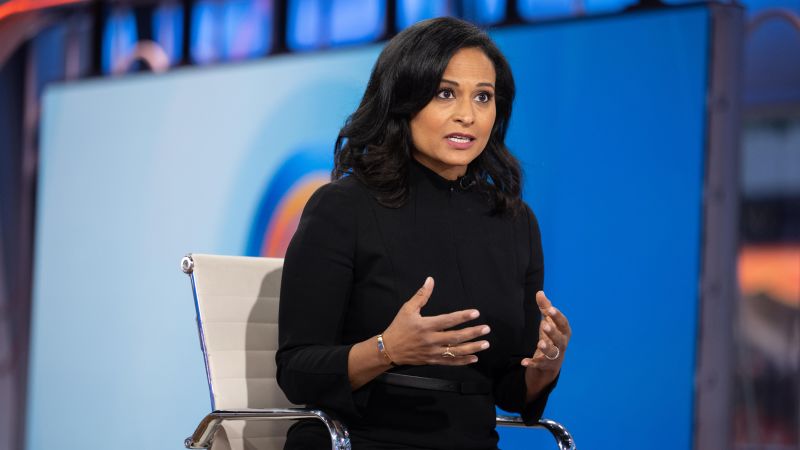Editor’s Note: A version of this article first appeared in the “Reliable Sources” newsletter. Sign up for the daily digest chronicling the evolving media landscape here.
The Kristen Welker era of “Meet the Press” is off to a bleak start.
The high-stakes sit down with disgraced former president Donald Trump was all risk and little reward for Welker as she assumed the esteemed moderator chair of “Meet the Press” for the first time Sunday. Television executives I surveyed before and after the interview were baffled that NBC News and Welker willfully chose to take on such a fraught assignment, given Trump’s notorious propensity to lie. As one television executive put it to me, “It was a crazy way to set the tone of what ‘Meet the Press’ would be under her.”
But the Peacock network opted to do it — and NBC News spent the entire week hyping Welker as someone who “met the moment” as a White House correspondent when “power was held to account” during Trump’s tumultuous presidency. Unfortunately, Welker failed spectacularly to meet the moment during her interview with Trump.
Welker allowed Trump to make a number of statements wholly untethered to reality on a range of critical issues without tenacious, resolute, or meaningful pushback. Trump, a rapid-fire lie machine, did his usual song and dance. He lied about the election. He lied about the insurrection that his lies had spawned. And he lied about pretty much every topic that Welker broached.
Throughout it all, Welker seemed ill-equipped to handle Trump’s trademark bravado. Lacking any noticeable fire in her belly, she at times timidly tried to set the facts straight. But Welker lacked the necessary fervor and apparent grasp of the subject material the massive platform requires to effectively counter Trump, who as The New York Times chief White House correspondent Peter Baker later told her, is like a “bulldozer shoveling falsehoods.” Trump clearly smelled weakness in the air, taking control of the interview as he ignored Welker’s hopeless — yet constant — pleas to “stay on track” and continued flooding the zone with outrageous lies.
“Mr. President, let me just ask this question, please—,” she pleaded at one point.
It was a low moment in Welker’s otherwise pristine career. And it’s sure to have consequences for the storied Sunday public affairs show, given that Welker’s debut was NBC News’ chance to refresh the program, define what role it will serve in the 2024 election, and win over the hearts and minds of viewers.
While the episode will likely see better-than-usual ratings because of the debut of Welker and anticipated interview with Trump, it is a fair bet that the manner in which she executed the Trump sit-down will have alienated a not insignificant swath of the audience. CNN, for instance, saw a tsunami of criticism wash over the network in the wake of its (also disastrous) town hall with Trump this spring — and the network is still trying to win back viewers.
But the interview also speaks to a larger problem that — somehow in 2023 — continues to confound the news media and the well-compensated television anchors tasked with effectively holding power to account. Even after Trump subverted democracy during the 2020 election, inspiring an actual insurrection on the US Capitol, newsrooms continue to struggle with how to cover him.
It’s arguable that, at this juncture, there is really no need to interview Trump. After years and years of seeing how he dishonestly operates, what exactly is there to glean from a sit-down? The near-certain result is that the outlet will record a stream of lies rushing out of his mouth, mixed in with absurd grievances about how supposedly unfair the system treats him. Does any of that really serve the public?
Some news executives seem to believe that Trump can make “news” during interviews, but pressing him on policy issues rarely yields consequential results. The public is well familiar with Trump and already knows that he is a man estranged with the truth. Further, it’s hard to believe that voters are deciding whether to support him based on his stance on specific issues.
As Trump once infamously bragged, he could shoot someone on Fifth Avenue and still maintain support from his loyal base of fans. Trump’s supporters are choosing to stand behind him because of his blustering personality and style. They lock arms with him because they believe he is boldly standing up for them and taking the fight to the elites. Not because of his position on Taiwan.
If it is necessary to interview Trump, newsrooms need to approach the task differently than they would any other interview. While there is a temptation among the D.C. class to pretend that newsrooms still operate in a 1990s-like era in which Republicans and Democrats are treated as opposite sides of the same coin, doing so is a grave error. The Republican Party of 2023 is very different than the Republican Party of yesteryear. And its leader, the twice impeached and four-times indicted Trump, is no normal politician.
When interviewing Trump, the goal cannot be to make “news” like one might attempt with a typical politician. The purpose of the interview must be to hold power to account. It must be about asserting the facts in a meaningful way and forcing Trump to confront them. He will still, of course, lie — but at least the audience might be able to see through the showmanship if the interviewer displays a firm grip on the subject matter and exerts command.
Unfortunately, few in the press who have taken on the assignment have proven capable of executing the difficult task in a compelling way. That doesn’t bode well for the news industry or, more importantly, democracy at large.
Read the full article here













Leave a Reply